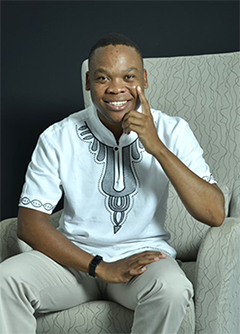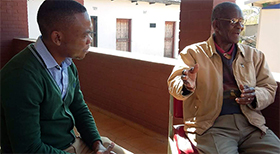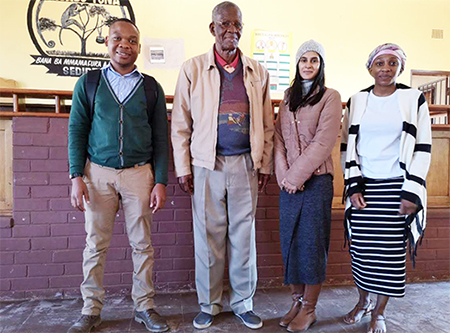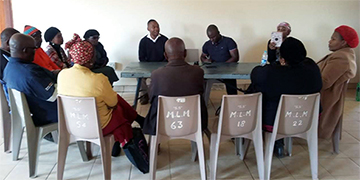

Macdonald Rammala (IDRA)
There is a place for customary law in South Africa and MacDonald Rammala, an emerging researcher at Unisa’s College of Law, is investigating how traditional dispute mechanisms can be implemented.
"I was worried that traditional ways of resolving disputes are somehow dissolving because every time you hear about a court case that involves customary law, it’s when it goes up to the constitutional court," says Rammala, leader of the Lekgotla La Batho project under Unisa’s Institute for Dispute Resolution in Africa (IDRA).
Lekgotla La Batho is a community-engaged participatory research project that aims to regenerate community knowledge for dispute resolution in the South African context.
Rammala experienced community governance through a lekgotla (traditional court) in the village where he grew up. As a researcher, he is investigating the current role of customary law and resolution mechanisms with the community of Makapanstad in the North-West Province. Makapanstad consists of approximately 32 villages and is under the traditional leadership of Kgosi Nchaupe Makapan III.
Working with the community, he is finding and reviving traditional dispute mechanisms that are currently practised across a spectrum of different cases.
Rammala notes that traditional dispute resolutions were initially not recorded; the young members of lekgotla keep track of all proceedings. These records can also serve as a court roll when cases are escalated to the formal justice systems.

Macdonald Rammala (IDRA) engaging with an elder in Makapanstad
The objective is to be in line with constitutional requirements - so that when traditional courts are used, the traditional way of resolving disputes will benefit as many communities as possible, especially when dealing with minor crimes.
Rammala is spreading the message about the value of traditional dispute resolution, using the communication skills he has polished since participating in the Unisa Skills Development Programme in 2017. This was a series of workshops hosted by the Research Support Directorate on writing for the popular media.
His article entitled "How signs in the townships affect young people’s opportunity to envision a better future for themselves - a reflection of not living in the same dimension and the thinking won’t be the same," won the Skills Development Programme competition during the 2017 Annual Research & Innovation Student Showcase.

Macdonald Rammala (IDRA), JN Tlhabane (Bakgatla Ba Mosethla Traditional Council), Eveshinie Reddy (IDRA Research Team) & Dephine Chinete (Student Note-taker and Observer)
Since the writing skills programme, he has been invited to speak on community radio stations and on SA FM, and has had his research work featured in independent newspapers, Unisa media platforms and other publications. Furthermore, he has been invited as a guest speaker at a number of Unisa and external events and has presented research papers at national and international conferences.

Village consultants with Unisa research team and members of the Makapanstad community
"Communication skills are of a great deal of value when conducting research because through conversations you have to capture what is important and you establish relationships," Rammala says. "If you fail to engage in social conversations as a researcher, you are unlikely to gain the trust of the community."
Most people in the villages where he does his research cannot read and write, but the knowledge that they share is powerful and Rammala is on a mission to document its true worth and make it known.
"My work is not in the office; my work is out there with the community to conduct research, further connecting research with people, in order to write articles and publish for dissemination."
In partnership with the community of Makapanstad, Rammala is working on a scholarly book on customary law which is aimed at enhancing traditional dispute resolution mechanisms.
Rest assured, the knowledge Rammala is gaining will not be confined to his book; he will be spreading the word on his findings to the benefit of all.
* By Mpho Moloele, PR and Communication Assistant, Department of Research Administration
Publish date: 2019-02-22 00:00:00.0